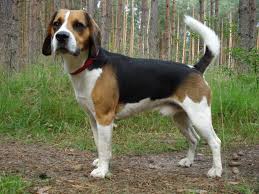
Beagle-Harrier
Conditions of detention
Beagle-Harriers can adapt to both urban and rural environments but thrive best in homes with access to outdoor spaces where they can exercise and explore.
Useful Fact: They require regular physical activity and mental stimulation to prevent boredom and ensure they remain happy and healthy
Nutrition and diet
A balanced diet with high-quality dog food that includes proteins, fats, and carbohydrates is essential for Beagle-Harriers. Fresh meat, vegetables, and grains can supplement their diet.
Useful Fact: Monitoring their food intake is important as Beagle-Harriers are prone to obesity. Measured portions and limited treats can help maintain a healthy weight.
Health
Beagle-Harriers are generally healthy dogs but can be prone to certain health issues such as hip dysplasia, ear infections, and hypothyroidism. Regular veterinary check-ups are important.
Useful Fact: Regular ear cleaning is essential to prevent ear infections, particularly due to their floppy ears that can trap moisture and debris.
Grooming and care
The Beagle-Harrier has a short, dense coat that requires minimal grooming. Regular brushing helps remove loose hair and keep their coat healthy. Bathing should be done as needed.
Useful Fact: Despite their short coat, Beagle-Harriers shed year-round, so regular brushing can help manage shedding and keep their coat looking its best.
Education and training
Beagle-Harriers are intelligent but can be somewhat stubborn, making training a challenge. Early socialization and consistent, positive reinforcement training methods are crucial.
Useful Fact: They respond well to food rewards, which can be used effectively during training sessions to motivate and engage them.
Toys and entertainment
Interactive toys, puzzle games, and activities that engage their scent-tracking instincts are excellent for keeping a Beagle-Harrier mentally stimulated.
Useful Fact: Beagle-Harriers enjoy games that involve using their nose, such as hide and seek with treats or toys, and they love to play fetch.
Safety
A secure, fenced yard is important for Beagle-Harriers to prevent them from wandering off while following scents. Supervision during outdoor activities is recommended.
Useful Fact: Their strong sense of smell can lead them to chase after scents, so keeping them on a leash during walks is essential for their safety.
Accessories
Sturdy collars and leashes, comfortable bedding, and grooming tools are essential accessories for a Beagle-Harrier. Crate training can also be beneficial for travel and safety.
Useful Fact: Reflective gear enhances safety during evening or early morning walks, making them more visible to others.
Socialization
Early and ongoing socialization with other dogs, animals, and people is important for Beagle-Harriers. It helps them develop a well-rounded temperament.
Useful Fact: Regular socialization helps prevent shyness or aggression and ensures they are friendly and adaptable in various situations.
Travel and Transportation
Beagle-Harriers can adapt to travel if introduced gradually. Secure crates or harnesses in vehicles ensure their safety during trips.
Useful Fact: Bringing familiar items, such as their favorite blanket or toy, can help reduce travel anxiety and make them more comfortable.
Behavior and psychology
Beagle-Harriers are known for their friendly, curious, and energetic nature. They require regular mental and physical stimulation to prevent boredom and destructive behavior.
Useful Fact: Their loyalty and close bond with their family make them excellent companions, but they can exhibit some independence due to their hunting background.
Legal aspects
Owners should be aware of local regulations regarding pet ownership, including licensing, leash laws, and specific breed regulations.
Useful Fact: Keeping vaccination records and adhering to local pet laws ensures the safety and legality of owning a Beagle-Harrier.


